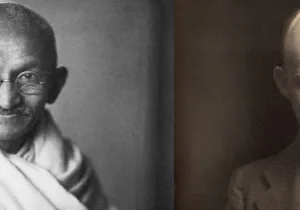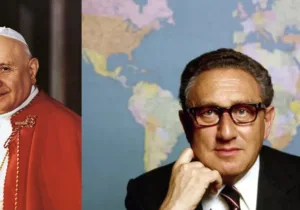The world is watching as Beijing hosts the XXIV Winter Olympiad. There is something about the Olympics that elicits national pride, from the colorful parade of nations to stirring podium anthems to the moving stories of individual athletes. But is sport a form of patriotic action? To be more specific, is athletic victory a sort of diplomatic win? If the United States loses to China in skating or to Russia in hockey, is that some sort of strategic blow? Should it make Americans question our mettle? G.K. Chesterton provides helpful reflections on the intersection of patriotism and sport.
Chesterton (1874 – 1936)—an orthodox Catholic who published thousands of articles and essays, as well as a new book every year, for decades—is not nearly as well known today as the generation of Christian authors he influenced, notably C.S. Lewis and J.R.R. Tolkien. However, during his lifetime thousands across the English-speaking world read his opinion editorials daily.
In his essay “Patriotism and Sport,” Chesterton mocks those who see national sporting losses, such as the English rowing team losing to Belgium or a French golfer besting an Englishman, as national cataclysms. Chesterton is pointing to a set of false assumptions that the English upper class in his day had about sports. One such assumption is that the professional athlete has much in common with the amateur sportsman; therefore, athletic victory is shared across the body politic. Another assumption in the class-rigid Britain of his day was that “Waterloo was won on the fields of Eton”; in other words, wealthy elites are at the center of the national soul. A third assumption is that strength in sports is somehow an essential diagnostic of national grit.
Chesterton begins by debunking the notion that the professional athlete is all that much like the average population. The reality is that to reach that level, one must be extraordinary. Certainly, this is one of the things that inspire us about the Olympics today. We realize that each of the athletes whom we cheer for is a human being, with a family at home, friendships, life challenges, and successes. But the Olympics also shine the light on the sacrificial decisions and cultivated talent necessary to compete at that level: continuous training year after year after year in a single discipline. When we learn that thousands of people compete for a single slot on a US team, we quickly realize that both in terms of commitment and abilities, the Olympian is human (not superhuman) and, at the same time, extraordinary. If you don’t think so, try skiing a slalom, clock your lap time in a pool, or just stand next to an Olympic volleyball or basketball player.
Chesterton’s larger point has to do with how we think about our national identity and pride in the context of sport. This is of particular interest when other geopolitical issues are at play, such as the deep concerns about China’s ethnic cleansing of its Uighur populace and its repressions of Tibetan Buddhists, Christians, Falun Gong, and other groups that the Communist Party sees as non-conforming. These terrible human rights concerns are dealt with in a separate essay as well as by other Providence writers. The point is that there are political intersections with sport that are less about winning and losing and more about the context of fair play, whether it is the Nazis barring Jews from participating in the 1936 Olympics or concentration camp laborers sewing Olympic uniforms.
Chesterton notes how an upper-class sentiment at his time thought that Eton and similar academies developed leaders among the elites, and these elites led the British mob to glorious victories at Waterloo and elsewhere. Chesterton disagrees. Instead, he says, there was a hardy athleticism of body and soul that allowed the British army and navy to fight their way up the Iberian Peninsula and ultimately stand up to Napoleon’s Imperial Guard at Waterloo:
In the Waterloo period there was a general rough-and-tumble athleticism among average Englishmen. It cannot be re-created by cricket, or by conscription, or by any artificial means. It was a thing of the soul. It came out of laughter, religion, and the spirit of the place.
Chesterton is not really talking about cricket; he is talking about the things that unify a country and give it its mettle. We saw that grit in the doughboys who sailed “over there” during World War I: “The Yanks are coming, the Yanks are coming … so beware!” We saw it in the righteous indignation of GI Joes trudging their way to hard-earned victories in North Africa, Europe, and the Pacific during World War II. It is not just athleticism, although nearly all military personnel of those eras testified to the physical toughening their service entailed. No, it is a thing of the soul, a love of country (spirit of the place), camaraderie, shared culture, and religious faith. It often develops in the context of the camaraderie of shared endeavor, by earning a spot and contributing to a team.
What does this mean for the Winter Olympics of 2022?
First, it is appropriate to cheer on one’s countrymen as they compete in the Games. But as spectators, we must be careful that the pleasure found in the sport does not inflate to the level of worship either of athletics in itself or individual athletes in and out of the arena. It is common during the Olympics to speak in national terms: the United States beat Germany, or Japan beat Canada. One makes a mistake when this metaphor is disassociated from the reality—that an individual person from the United States beat an individual person from Germany or a team of Japanese athletes beat a team from Canada. Chesterton argues that we must not treat the athlete as representative of a millions-greater whole and thereby treat the athletic victory of the individual as a moral victory intrinsic to the virtue of our nation. That is where the athlete or team becomes a source of patriotic feeling. This, Chesterton explains, is the wrong way to look at sports. It is a morally weak citizenry that hails its nation as strong when it wins at skiing and weak when it loses at snowboarding.
Second, it is appropriate to applaud the work of dedicated athletes who have worked hard in their sport to reach the Olympic level. Their stories can be encouraging or inspiring. The Olympics claim to rally together the best athletic talent from all the nations, and watching the athletes perform, one cannot deny that incredible talent is there. In fact, many individuals, such as Jesse Owens in 1936, provide important examples of citizenship and sportsmanship. However, as Chesterton observes in comparing the players on the fields of Eton with the soldiers who marched to Waterloo, the Olympians who will compete in Beijing this winter may represent the best in their sport, but they do not necessarily represent the best in their nation. A nation’s strength is not derived from its athleticism; a nation, and its citizen-athletes, draw strength from deeper wells.
Reference
Chesterton, G.K. “Patriotism and Sport.” All Things Considered. London: Methuen & Co., 1908.








 Live in the DC area? Sign-up for Providence's in-person events list!
Live in the DC area? Sign-up for Providence's in-person events list!